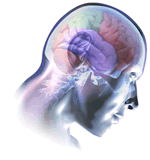Neurocognitive
Impairment is Common among HIV Positive Children and Adolescents
 |
 |
 |
 |
 |
 |
 |
| SUMMARY:
Children and adolescents who were infected with
HIV through mother-to-child transmission may have
a high risk of neurocognitive impairment, according
to a study described in a letter to the editor in
the September 1, 2010 Journal of Acquired Immune
Deficiency Syndromes. While the number of children
in this analysis was small, the findings suggest
that neurocognitive problems in people with HIV
are not solely related to aging. |
|
 |
 |
 |
 |
 |
 |
 |
By
Liz Highleyman
 Studies
have shown that HIV-related
neurocognitive impairment remains common despite effective
antiretroviral therapy (ART). One
recent study found a frequency of about 25%.
Studies
have shown that HIV-related
neurocognitive impairment remains common despite effective
antiretroviral therapy (ART). One
recent study found a frequency of about 25%.
Some
experts have suggested that neurocognitive impairment among
HIV positive people is largely attributable to the fact that
this population is now living long enough, thanks to ART,
to develop normal age-related problems. Others have noted
that HIV appears to accelerate the aging process and speed
development of progressive age-related conditions. But cognitive
impairment among young people with HIV -- particularly those
who have been infected their entire lives -- has not been
extensively studied.
Yasotharan
Paramesparan from Imperial College London and colleagues looked
at neurocognitive function in 2 groups of HIV positive individuals.
Participants in the younger group were 16 to 25 years of age,
while the older group was over 60.
"High
rates of HIV encephalopathy and cognitive impairment are well
described in infants and children with vertically acquired
HIV infection," the study authors noted as background.
"Despite reductions in incidence due to the availability
and wider use of combination antiretroviral therapy, learning,
behavioral, and motor deficits commonly persist."
The
investigators conducted a detailed computerized neurocognitive
assessment (known as Cogstate) to test multiple cognitive
domains including psychomotor function, executive function,
memory, and attention. They also used the International HIV
Dementia Scale, a validated tool that incorporates timed finger
tapping, sequential movement, and verbal recall.
The
analysis included 6 younger and 31 older HIV positive participants.
The average age of younger group was 19 years (range 17-23
years) and the older group had a mean age of 65 years (range
60-77 years). All participants in the younger group had vertically
acquired, or perinatal, HIV infection.
All
of the older participants and 4 of the younger ones were on
combination ART and had undetectable plasma viral load for
a minimum of 3 months. Immune function was well preserved,
with average CD4 cell counts of 618 and 575 cells/mm3 in the
younger and older groups, respectively. People with other
conditions that could affect cognitive function, including
history of recreational drug use, active opportunistic infections,
hepatitis C coinfection, or any neurological disease or symptoms,
were excluded.
Results
 |
4 of 6 younger participants (66.7%) and 6 of 31 older
individuals (19.4%) met the diagnostic criteria for neurocognitive
impairment. |
 |
In
a linear regression analysis, the presence of neurocognitive
impairment was significantly associated with younger age
(P = 0.048) and being in the younger study group (P =
0.016. |
 |
There
was a trend toward higher rates of neurocognitive impairment
among females, but this did not reach statistical significance
(P = 0.08). |
 |
In
a multivariate analysis, only being in the younger study
group remained a significant predictor of neurocognitive
impairment. |
"This
pilot study reveals high rates of asymptomatic neurocognitive
impairment in perinatally infected HIV positive young adults
(67%) when compared with older subjects (19%)," the researchers
wrote. "Such rates greatly exceed those observed in the
cohorts of horizontally infected young adults, which we and
others have assessed previously."
Furthermore,
they added, "these results may be an underestimation
of true neurocognitive impairment prevalence in perinatally
infected young adults." Of approximately 57 young adults
attending their adolescent HIV clinic, only 6 were neurologically
asymptomatic and therefore eligible for the study. None of
the 6 had a history of prior AIDS-defining events, which is
associated with increased risk for cognitive impairment among
older people.
Although
the study included only a small number of younger participants,
it demonstrates that aging is likely not the only factor contributing
to neurocognitive problems in people with HIV.
Investigator
affiliations: Division of Medicine, Imperial College London,
UK; Department of HIV Medicine, Imperial College Healthcare
NHS Trust, London, UK; 900 Clinic, Imperial College Healthcare
NHS Trust, London, UK.
12/10/10
Reference
Y Paramesparan, LJ Garvey, J Ashby, and others. High rates
of asymptomatic neurocognitive impairment in vertically acquired
HIV-1-infected adolescents surviving to adulthood. Journal
of Acquired Immune Deficiency Syndromes 55(1): 134-136.
September 1, 2010.
